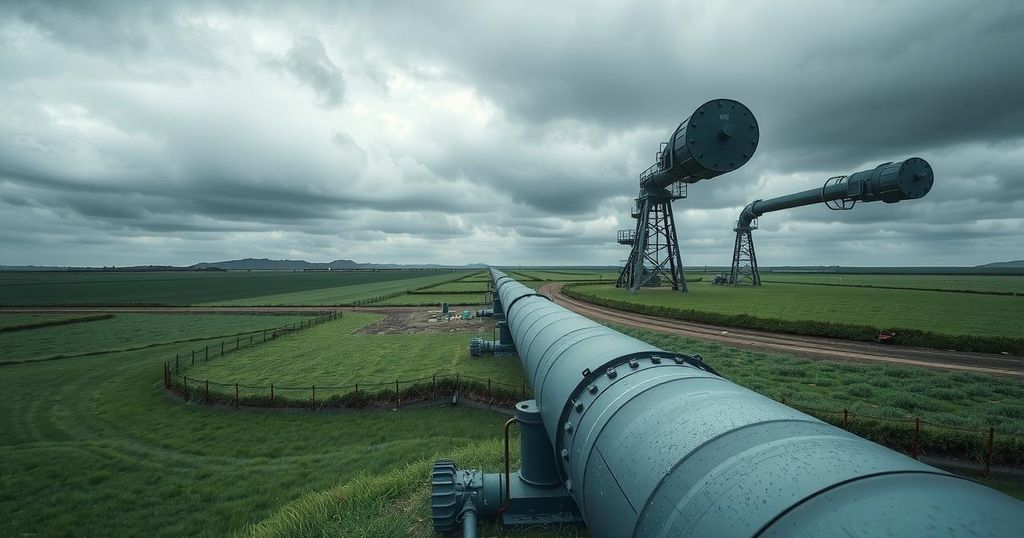Russian troops launched a surprise attack using a gas pipeline in the Kursk region against Ukrainian forces. President Zelensky emphasized Ukraine’s commitment to peace ahead of meetings with U.S. representatives in Saudi Arabia. France announced funding for military assistance using interest from frozen Russian assets. Concerns were raised about U.S. military aid and intelligence cuts, while a Ukrainian drone attack deep into Russia marked an escalation of tensions.
Recent reports indicate that Russian troops utilized a gas pipeline as a method of conducting a surprise assault on Ukrainian forces in the Kursk region. According to pro-Russian military blogger Yuri Podolyaka, Russian special forces spent several days in the pipeline prior to their attack near the town of Sudzha. This operation is part of Russia’s ongoing efforts to drive Ukrainian soldiers from the Kursk area, previously seized by Ukraine in August last year as a strategic maneuver for negotiations.
Ukrainian President Volodymyr Zelensky has expressed Ukraine’s unwavering commitment to pursuing peace ahead of a meeting with U.S. representatives in Saudi Arabia next week. He has stated that realistic proposals for peace remain available and emphasizes the necessity for prompt and effective action. Mr. Zelensky will engage with Crown Prince Mohammed bin Salman on Monday, followed by discussions with the U.S. officials.
Additionally, France plans to utilize interest derived from Russian assets to provide €195 million in military aid to Ukraine. Armed Forces Minister Sebastien Lecornu revealed that some funds will be allocated for critical military supplies, including artillery shells and bombs for fighter jets previously supplied to Ukraine. This decision aligns with the commitments made by G7 nations to support Ukraine financially.
Shadow Home Secretary Chris Philp has voiced serious concerns regarding the recent cuts in U.S. military assistance and intelligence sharing with Ukraine, addressing its crucial implications in the ongoing conflict. He emphasized the moral obligation of the United Kingdom to support Ukraine against what he termed barbaric aggression from President Putin.
In an escalation of hostilities, a Ukrainian drone struck an industrial facility in Chuvashia, Russia, marking one of the deepest incursions into Russian territory to date. Although the regional governor confirmed the incident caused no casualties, unofficial sources reported other Ukrainian drone attacks targeting oil refineries in Ryazan and Lipetsk, although verification remains pending.
Former Deputy Prime Minister Lord Heseltine has called for a significant reevaluation of Brexit, especially concerning defense and security in light of recent U.S. military policy changes under Donald Trump. He suggests that such discussions could pave the way for a unified European military command structure to strengthen the continent’s defense capabilities.
Latvian President Edgars Rinkevics advocated for increased military spending and the introduction of conscription among European nations, identifying a need for greater military capability amid shifting geopolitical landscapes. Latvia’s initiative follows its own conscription reforms and highlights concerns over European defense preparedness given the current global complexities.
Russia’s Defense Ministry announced the capture of the village of Konstyantynopil in Ukraine’s eastern Donetsk region, amidst ongoing warfare and territorial shifts. Concurrently, the King of the United Kingdom expressed concern over rising tensions between the U.S. and Canada and urged global unity amid ongoing international unrest due to the war in Ukraine.
Complicating matters, the U.K. government has faced scrutiny related to its coalition-building efforts regarding support for Ukraine, particularly in light of recent U.S. decisions to limit intelligence sharing. Cabinet Office Minister Pat McFadden did not comment explicitly on the U.S. stance but reiterated the U.K.’s commitment to supporting Ukraine militarily and with intelligence as the conflict persists, emphasizing the need for a lasting peace rather than merely a temporary ceasefire.
In conclusion, the current conflict between Ukraine and Russia remains multifaceted, involving strategic military operations, international diplomatic engagements, and ongoing support from various nations. Key developments include Ukraine’s push for peace negotiations, France’s commitment to military aid funding, and calls for enhanced European defense initiatives. Concerns surrounding U.S. military support have prompted discussions on the necessity of continued assistance for Ukraine, amidst a backdrop of shifting global alliances and geopolitical tensions. These events significantly impact the dynamics of the conflict and the broader security landscape in Europe.
Original Source: www.independent.co.uk




